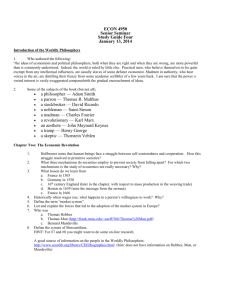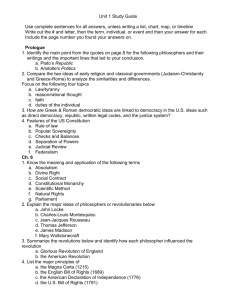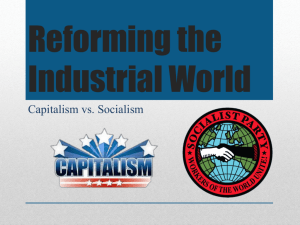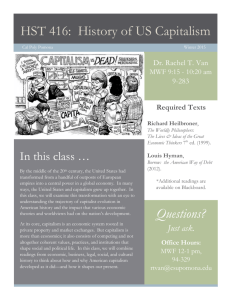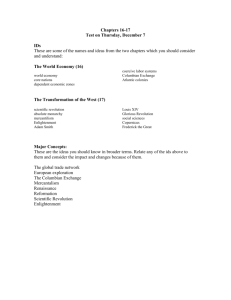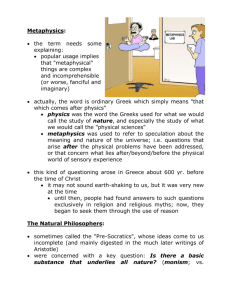The Worldly Philosophers: Chapters 6
advertisement
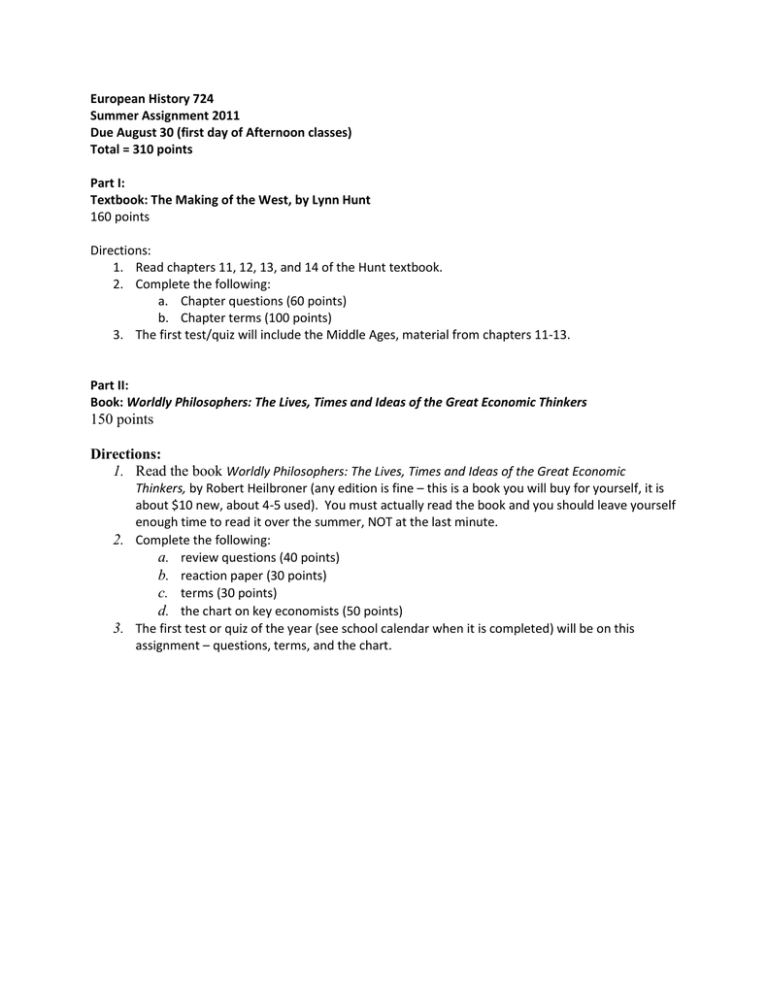
European History 724 Summer Assignment 2011 Due August 30 (first day of Afternoon classes) Total = 310 points Part I: Textbook: The Making of the West, by Lynn Hunt 160 points Directions: 1. Read chapters 11, 12, 13, and 14 of the Hunt textbook. 2. Complete the following: a. Chapter questions (60 points) b. Chapter terms (100 points) 3. The first test/quiz will include the Middle Ages, material from chapters 11-13. Part II: Book: Worldly Philosophers: The Lives, Times and Ideas of the Great Economic Thinkers 150 points Directions: 1. Read the book Worldly Philosophers: The Lives, Times and Ideas of the Great Economic Thinkers, by Robert Heilbroner (any edition is fine – this is a book you will buy for yourself, it is about $10 new, about 4-5 used). You must actually read the book and you should leave yourself enough time to read it over the summer, NOT at the last minute. 2. Complete the following: a. review questions (40 points) b. reaction paper (30 points) c. terms (30 points) d. the chart on key economists (50 points) 3. The first test or quiz of the year (see school calendar when it is completed) will be on this assignment – questions, terms, and the chart. A. Review Questions (total 40 points): The Worldly Philosophers: Chapters 1-3 (10 points) 1. Explain the “three ways of guarding against…calamity” and how exactly they prevented calamity. 2. Why was working for personal gain frowned upon before the “economic revolution”? 3. Heilbroner argues that four major developments that led to the “revolution.” What were they and how did they lead to the revolution? 4. Explain (using your own examples) the following Laws established by Adam Smith: a. The laws of the market: b. The Law of Accumulation: c. The Law of Population: 5. Would Adam Smith support or refute mercantilism? Why? The Worldly Philosophers: Chapter 4-5 (10 points) 1. Explain the following laws of Malthus and Ricardo: 1) Malthus’ law of population: 2) Ricardo’s laws of rent: 2. Describe Malthus’ and Ricardo’s contemporary society and any impact it had on their ideas. Did they consider the needs of the poor in their theories? 3. Why were children working at such a young age? Why would parents allow them to work in such conditions? 4. Is it possible to create a “utopia” in today’s society? The Worldly Philosophers: Chapters 6-7 (10 points) 1. According to Marx, capitalism is self-destructive. Explain what he means by that. 2. Why haven’t the majority of Americans accepted socialism or communism? What are the benefits/detriments of such systems? 3. Explain John Hobson’s attack on capitalism and imperialism. Do they always go together? The Worldly Philosophers: Chapters 8-10 (10 points) 1. How were the impacts of the industrial revolution different in Europe and the US? How did the laissez-faire policies of Europe differ from free enterprise in the US? 2. Explain in your own words, Thorstein Veblen’s critique of capitalism 3. How did John Maynard Keynes explain the cycles of economic prosperity and decline; how did he explain economic depressions and what was his solution? 4. How did Joseph Schumpeter explain the cycles of economic prosperity and decline; how did he explain economic depressions and what did he think would happen to capitalism? B. Reaction Paper (20 points): Write a two page, double-spaced reaction paper on the Worldly Philosophers book. Focus on the following chapters: Adam Smith, Karl Marx, and John Maynard-Keynes. Reaction paper means: Explain the economic insights you gleaned from the chapters; what did you learn about the field of economics. Papers should be proof-read and free from major grammatical and typographical errors. Papers should be well-organized with strong sentence and paragraph construction. Your paper/ideas should flow from one topic to the next with logical progression. C. Terms: Identify and explain the significance of the following terms from the book Worldly Philosophers: The Lives, Times and Ideas of the Great Economic Thinkers When asked to “IDENTIFY” and “EXPLAIN THE SIGNIFICANCE” of a term, person, place, or event do this in two parts: describe the WHO or WHAT the term is, WHERE it happened or had the impact, and WHEN it happened (keep in mind you need enough info to help you when you review this next May) and describe WHY it is important (the CAUSE of the tem) or (the EFFECT or IMPACT of the term) Identify and explain the significance of the following terms: 1. Anarchism 2. Bourgeoisie 3. Capital and Capitalists 4. Classical Economists 5. Communism 6. Conspicuous Consumption 7. Dialectical Materialism 8. Economic Imperialism 9. The Economic Revolution 10. Enclosure Movement 11. Entrepreneur 12. Father of Anarchism 13. Father of Modern Economics 14. Founder of British Socialism 15. Founder of French Socialism 16. Francois Quesnay (1694-1774) 17. Black Thursday, 1929 18. The Great Depression 19. Historical Materialism 20. Industrial Revolution 21. Iron Law of Wages 22. Laissez Faire 23. Malthusian Doctrine 24. Marxism 25. Mercantilism 26. Monopoly 27. Neo-Malthusianism 28. The New Deal 29. Physiocrats 30. Proletariat 31. Robber Barons 32. Scientific Socialism 33. Socialism 34. Utopian Socialists 35. The Victorian Age D. Chart on Key Economists: (see next page)
